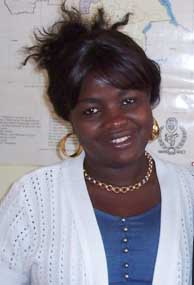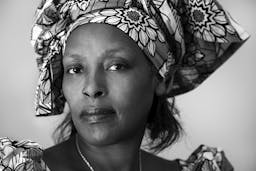Fighting Evil from Inside Hell
Apr 23, 2020
Story

U.N. Special Representative Margot Wallstrom has nominated our homeland, The Democratic Republic of Congo, as the “rape capital of the world.” It is reported that 48 women are raped every hour in Eastern Congo. In this day and age, you might expect there to be a powerful uprising of militant women activists, denouncing with vehemence such animalistic behaviors, and demanding with a deafening force that a REAL war be engaged to immediately end the violence done to their sisters, mothers, and daughters. But when one is trying to fight evil from the inside of hell itself, you’ve got to be smart and learn how and when and just how much pressure you can apply before you find hell’s flames set to engulf you. Enter the Gloria Steinem of Congo, one of our World Pulse sisters, Chouchou Namegabe (pronounced shoo-shoo), a 2009 VOF Applicant. As a radio journalist in DRC, Chouchou has been as actively engaged in this fight as any woman can be; ‘on the air’ as it were, since before these things began; an activist before anyone in this country knew what an activist was. She said: “I remember in 1999 when the reports began to come in that these militias were raping women, and we didn’t have a word for rape in Swahili.” Such things were culturally taboo to speak about, so no such words had crept into our common language. She said they came across a word in the Swahili spoken in Tanzania – ubakaji – that has of course become commonplace in our local language now. Chouchou grew up in a typical household in Eastern Congo, where the radio was off limits for the women of the house. And as one seemingly born to make a way where there is no way, Chouchou started her radio broadcast career at only 17 years of age. Two years later the war broke out, and before long the station was shut down by rebel factions. In 2001 the station reopened, and Chouchou, by now an appalled, horrified, and sickened young journalist, determined to use her skills to engage in the fight. Her idea was to give a voice to the victims; enabling them to give anonymous accounts of their otherwise unspeakably savage treatment as involuntary weapons of war. With this goal in mind, she sought her first interview. Now some 10 years later, her weekly programs are being broadcast by 19 radio stations. And with over 400 interviews recorded through the years, she’s been able to make personal to every listener the fact that the pages of this sadistic chronicle, affecting every family in every territory, are still being written. You can imagine this commitment is met daily with heartache. One of Chouchou’s more painful interviews was with a 5 to 7 year-old girl who had been raped and then further abused with sticks from thorn bushes. When Chouchou met with her in the hospital, the little girl’s female organs had been removed and she was incontinent. She looked at Chouchou and asked, “Will I ever be a woman?” Chouchou could only cry in response. In 2003, Chouchou co-founded South Kivu Women’s Media Association (AFEM), which is the banner over the brisk and very full offices in which we met. They immediately began training women in an effort to create a force of female journalists to promote women’s rights. They taught them how to approach victims in order to win their confidence so their stories could be told. The association also created its own production studio to develop the weekly radio programs to be broadcast over the airwaves of the various partner stations. In 2006, AFEM was able to get a sponsor to provide radios that they could distribute to women in seven of South Kivu’s eight territories. With that, AFEM started The Listeners’ Club. As their focus is the rural areas, they used the radios to gather the women and train them in the necessity and art of sharing their stories with one another. Every woman trained becomes a trainer/facilitator, who then takes The Listeners’ Club to her village, with or without a radio. As a result, the Listeners’ Clubs have continued to proliferate. Women who were brought up to never speak about such things are now sensitized to the idea of opening up to one another. In September of this year, with the national election two months away, AFEM invited 15 of our government’s leading authorities to a conference to answer how they were engaging in the fight – what they had done, what they were doing, and what they planned to do if re-elected. The invitees included the governor, the vice governor, the president of Parliament and others, and they all RSVP’d. But on the day of the conference, not a single Authority was represented. Chouchou made a number of calls to those invited, and unbelievably ALL said they were traveling and not even in the capital. The media on the other hand, had shown up in great force and so the event became a press conference, with Chouchou behind the microphones. She opened with, “This is another case of gender-based violence, this time by our government! They didn’t even delegate someone from their staffs to attend.” Yes, Chouchou is very bold, but it is focused; always on point. After testifying before the U.S. Senate in 2009 she was asked, “Are you sure you want to go back to Congo?” She said yes. They said, “You are sure? You are not afraid?” Her response was, “Congo is where I must be.” When asked if Chouchou would ever want to be in politics, she said, “No, I am working to support other women in that area.” This year, in preparation for the national and upcoming local elections, AFEM held awareness seminars through the rural areas to get the women involved in the process, and interviewed all the female candidates on their radio programs. “I believe in women,” she said. “I believe women will transform this country. And I’m into revolution!” This article is part of a writing assignment for Voices of Our Future a program of World Pulse that provides rigorous new media and citizen journalism training for grassroots women leaders. World Pulse lifts and unites the voices of women from some of the most unheard regions of the world.




